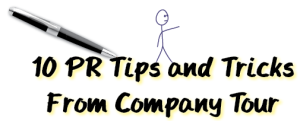By: Alyssa Schaefer
 I know a lot of young professionals attempting to break into public relations are eager to get their foot into the entertainment industry door.
I know a lot of young professionals attempting to break into public relations are eager to get their foot into the entertainment industry door.
Who can blame them? We live in a modern society that is fiercely driven by pop culture. The entertainment industry seems to possess a mysterious power to become disturbingly addicting. Consumers can’t get enough, and producers seem to be finding endless dynamics to formulate the next break-out sensation.
However, it is important not to be fooled by the shimmering streets of Hollywood. Behind this industry is a whole army of people working against impossible standards in order to ensure the success of their childhood dreams.
You may find it helpful to get some background knowledge of the industry, and what sort of world you would be dealing with if you choose to pursue a career in entertainment PR, or just the field of entertainment in general.
This article is based on knowledge I’ve gained from my internship this summer at a talent agency – and also knowledge that I’ve picked up through the clients at the agency (since we all know that listening to the customer is the #1 rule these days).
- It is important to have a good background or understanding of the talent you choose to represent. This could be closely identified with “product knowledge.” Knowledge of the product you’re selling is vital in any business scenario; the same is true in the entertainment industry. One should be able to recognize “good” talent when he or she sees it. The clients you represent want to know that you know what you’re talking about. Experience is key; build trust with your client by showing consideration for the product you both will be selling.
- A talent agent will spend a good amount of time networking with directors, photographers, choreographers, and other clients. It is absolutely essential that a talent agent possess great communication skills. Both the client and the talent agent will benefit from being extremely organized. The entertainment industry waits for no one. At times, auditions come up with little to no prior indication. It is of utmost importance that the talent agent stays on top of his or her “game” 100 percent of the time.
- Branding. Classifying one’s projected market is of course imperative in the success of the agency, and therefore the client. “How does this particular client want to be branded in the market he or she is aiming for?” Breakdowns – a list of requirements that casting is looking for – usually specify characteristics they desire in a talent. Knowing which characteristics are associated with each client allows you to pull the most equipped clientele for each specific audition. Every single client is unique, we must remember that we are dealing with the “public”; no one client will ever be the same. By branding your clientele, it not only shows great transparency and personal attention, it ensures a clear and projective path to success.
There are obviously many more qualities vital to success in the industry. These are simply the core values and ideas that I’ve taken away from my summer in the land of the rich and famous. I personally enjoy this fast-paced, “what-you-see-is-what-you-get” environment. However, those who are looking for a nurturing, routine-based work life should perhaps be advised to explore some different options!





